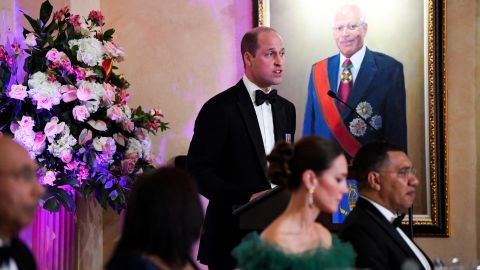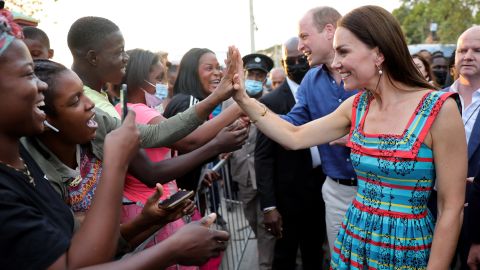Analysis: When royal tours fail
A version of this story appeared in the March 25 edition of CNN’s Royal News, a weekly dispatch bringing you the inside track on Britain’s royal family. Sign up here.
CNN
—
There’s a running joke among royal reporters that royal tours always end up being headlined “triumphant.” That’s because they are usually full of amazing energy and photo moments that lift spirits amid all the bad news in the world.
That won’t be the case this time. There has been a steady stream of negative headlines coming from the Duke and Duchess of Cambridge’s visit to the Caribbean and they drowned out the more positive coverage that was undoubtedly there, too.
It’s not that William and Kate did anything different this time round. Their trip still had all the hallmarks of a traditional royal visit: dancing, sporting events with a national hero, glamorous dinners and speeches. But what does appear to have changed is the tone around these trips, and they may need to adapt to that if the “triumphant” tour headlines are to return.
CNN wasn’t on this tour, but we have traveled extensively with the family. There are always republican and anti-monarchy demonstrations, which the royals don’t generally have a problem with, in our experience.
The family believe in self-determination, so if a country wants to replace the Queen with its own elected president as head of state then they will support that, as demonstrated by Prince Charles, who attended and endorsed the swearing-in of the new President of Barbados last year.
But over the past couple of years, those demonstrations have shifted. They are still about breaking ties with the monarchy, but it’s not just about independence and the future. It’s also about coming to terms with the past, and in many Commonwealth realms, that’s about the slave trade and Britain’s role in it. Many in these former British colonies also want an apology and reparations.

The royal family’s links to slavery date back to the 16th century. Queen Elizabeth I provided slave merchant John Hawkins with her own vessel “specifically for the purpose of capturing Africans on the West African coast,” according to an article in the UK’s national archives. Subsequent members of the royal family invested heavily in the slave trade. Many of the grand stately homes in Britain today were built on the profits of slavery and colonial exploitation.
The duke addressed the topic, discussing Britain’s historical role in slavery in his only speech during the couple’s stop in Jamaica, denouncing the “abhorrent” practice and expressing his “profound sorrow.”
For many, that won’t have been enough. A formal apology and acceptance of responsibility would open the door to questions about financial restitution. That is the domain of the UK government rather than the royals. When it comes to matters of state, members of the royal family act on the advice of the ministers, so an apology or reparations would need to be agreed with the government first.
Earlier in the day, in what appeared to be a tense meeting, Jamaican Prime Minister Andrew Holness suggested the couple’s trip to Jamaica could be the last with a British monarch as head of state, telling them the country was “moving on” and will attain its “true ambition” to be “independent.”
To critics, royal tours are jollies for an outdated British monarchy, but they are hard work for everyone involved and the reality is that they only happen at the request of the host country, which goes through the British government. It’s about promoting Brand UK and reinforcing international relationships. And the royals are regarded by the British Foreign Office as the ultimate promotional tool and major national asset.

American-British playwright, author and columnist Bonnie Greer said the royal tour model is “pretty archaic” and needs to be addressed “immediately.” She suggested a way to modernize them would be to have organizers ask a potential host country “to find a way to ask the people if they’d like a tour, and to feed back to the Royal Family.”
However, there are others who believe tours are a relic of the past and should be done away with altogether. Naomi Evans, co-founder of the Everyday Racism project, told us she finds them “problematic” and the world has outgrown them.
“There has been such an awakening of how racism, capitalism, colonialism, enslavement of people, has impacted our everyday lives and people are starting to see how problematic two people who have directly benefited from colonialism and…
Read More: Analysis: When royal tours fail

